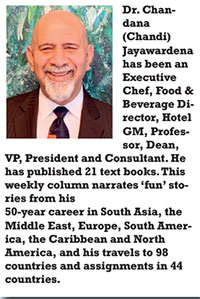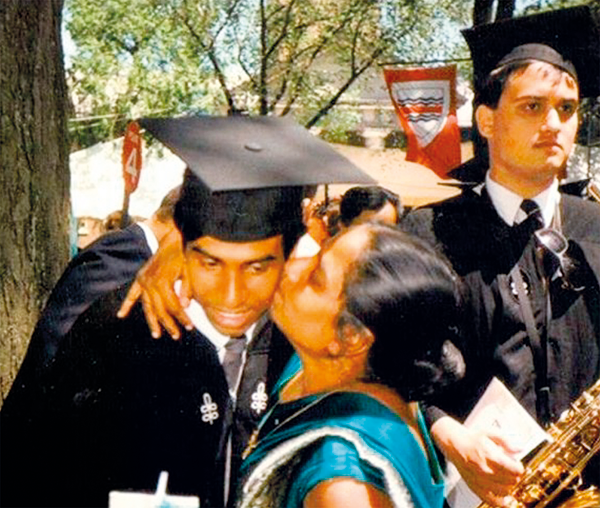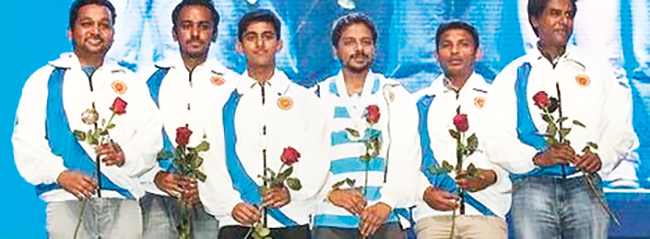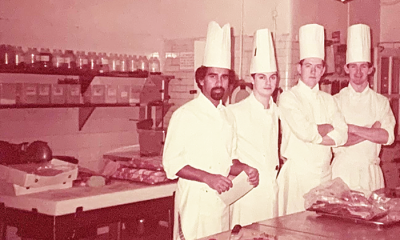Features
Malinda Seneviratne Award-Winning Poet, Journalist etc.
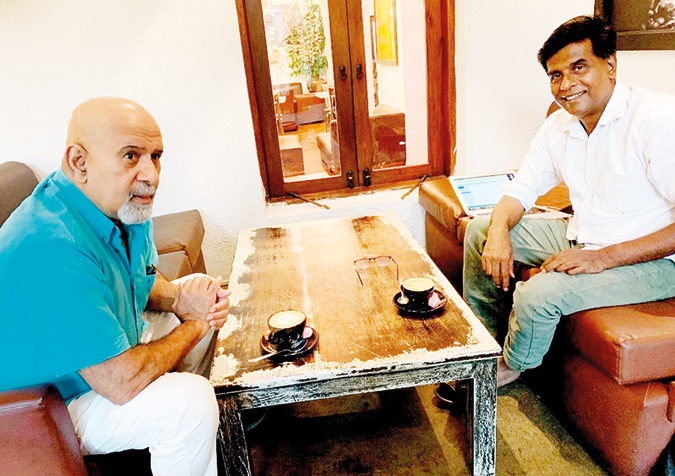
PLACES, PEOPLE & PASSIONS (3Ps)
Dr. Chandana (Chandi)
Jayawardena DPhil
President – Chandi J. Associates Inc. Consulting, Canada
chandij@sympatico.ca
A New Column
3Ps, which is a question-and-answer type column, will appear in the Sunday Island over the next ten weeks. This series will feature ten outstanding and versatile Sri Lankans, who have made significant contributions to their chosen fields. Today, we feature below a multi-talented and fascinating personality, whom I call my friend and mentor in creative writing, Malinda Seneviratne.
When I told him about my idea of 3Ps, Malinda was very supportive, but did not want me to write about him. “Chandi, writing about other people is what I do as a journalist”, he told me during our last meeting in Colombo in April 2023. After some gentle persuasion, he agreed to participate, but told me, “Chandi, please feature me on your tenth and last episode.” Today, he would be displeased with me for commencing the column, with the article about him.
Profile
Malinda is a journalist, political commentator, poet, translator, and a chess coach. He was educated at Royal College, Colombo, University of Peradeniya, Carlton College (Minnesota), Harvard University, University of Southern California, and Cornell University. A student of sociology, Malinda entered journalism in 2000. He has contributed articles to many English newspapers and Sinhala newspapers. He won the Gratiaen Prize for his poetry collection, ‘Edges’ and the prize for the Best Literary Translation offered by the Gratiaen Trust on two occasions. He has worked as an advertising copywriter and has devoted much time to chess, as a national player and a coach.
My First Meeting with Malinda
Twenty years ago, soon after I arrived from Canada with my wife and kids in November 2003 for a month-long holiday in Sri Lanka, my father called me at the Mount Lavinia Hotel. “Chandana, Malinda Seneviratne wishes to meet with you soon.” I asked, “who is Malinda?”. “Malinda is a brilliant young journalist. He is highly qualified, and you should meet him for a chat.” My father encouraged me.
Malinda met me for lunch at the hotel. He was humble and had a laid-back approach in interviewing me. He went with the flow, but when I said something that sparked his interest, he quickly asked several follow up questions. Within a week, Malinda published a half page article about me. It was very well written, and I was impressed with Malinda’s outstanding writing skills. I liked his style. After I returned to Canada, occasionally I kept in touch with Malinda.
Planting a Seed
In 2012, during my annual visit to Sri Lanka, Malinda met me again at the Mount Lavinia Hotel, to interview me for another article. At the end of that meeting, Malinda told me: “Chandi, although you don’t live here, you are a known brand. You have interesting experiences and fun stories. You should write a series of articles.” I laughed and rejected that suggestion, but later thought about it. Because at that time, I was very busy working as a college dean responsible for a team of 60 professors in three post-secondary schools in Toronto with a student population of 3,200. I simply did not have free time for such an undertaking.
Eventually, in early 2020 I decided to write an autobiographical column themed: ‘Confessions of a Global Gypsy’ but had to find a newspaper in Sri Lanka which would be interested in publishing it. I contacted Malinda and sought his advice. “Malinda, I am now ready to do something you suggested eight years ago. Can you recommend a newspaper for my column?” I asked him. Malinda explained his unorthodox working pattern: “Chandi meet me at the Commons Café, opposite Ladies College in Colombo, tomorrow morning. After I drop my daughters at their school, I spend the whole day at the Café, doing my work.”
Action
When I arrived at the Café, Malinda was busy in the open-air garden section, answering calls on his mobile phone, playing a quick game of chess on his laptop, smoking a cigarette, sipping a coffee, and giving advice to a young journalist, all at the same time! Then Malinda called one of his former assistants, now a Feature Editor of a major English newspaper, and suggested that I meet him immediately. I took a tuk tuk to the newspaper office and the deal for my column was finalized within an hour. However, soon after that, the global pandemic arrived and, unfortunately, that newspaper had to reduce pages and not accept any new columns.
A year later, in the middle of the pandemic, I e-mailed Malinda from Canada, and sought his help in finding another newspaper for my proposed column. “It is a bad time for my industry. All newspapers are affected by the pandemic, but I will speak with my former boss, Manik de Silva, the Editor of the Sunday Island. Chandi, send me a sample article. Write it about you hosting Fidel Castro in Jamaica,” Malinda suggested.
A week later, Malinda informed me that my article about Castro did the trick. He kindly introduced me to Manik de Silva, and the rest is history. I published 100 episodes of my column in the Sunday Island from early 2021 to March 2023, and am now getting ready to publish a book based on that column. Thank you, Malinda!
Q: Out of all the places you have visited in Sri Lanka and overseas, what is your favourite and most interesting place?
A: The Abhayagiriya Complex is a composite of history, architecture, scholarship, Buddhism, heritage, and politics: subjects that fascinate me and of which I have been a student, albeit in an informal sense. When I visit Abhayagiriya I obtain a sense of location and something of the sweep of historical processes. It tells me where I’ve come from, where I stand and where, ideally, I could go. I appreciate each and every brick of each and every artefact and I am duly humbled by the sweat, blood and tears that are congealed therein. A place for meditation on many things, including self.
Q: Out of all the inspiring people you have met, who inspired you most in creative writing?
A:My father, Gamini Seneviratne, a published poet whose work is read in our universities, has inspired me most, partly because it is with him that I have had the most extensive conversations on literature, but as importantly, because his poetry opened me to a kind of creative expression that was, at the time, new, exciting and, to my mind, potent. In his comments on my early attempts at writing and in his poetry itself, I learnt the absolute and non-negotiable need to be transparently honest, regardless of the consequences. He opened the doors of my mind to metaphor and economy.
Q: At the present time, what is your key passion in life, other than writing and chess?
A: Being. That, more than anything else, has been my key concern; I am reluctant to use the word ‘passion’ here for my signature is ‘sobriety.’ I have appreciated history and looked towards preferred futures, but I’ve always strived for honest and conscious ways of inhabiting the moment. So, I try to affirm the truths I’ve come to believe, subject of course to the limitation of knowledge, informed by my understanding of the greater good and tempered to the extent possible, given frailties, by the conscious consideration of the possibility of error. In this way I do things to make myself happy.
Q: From your time studying in five universities, which experience stands out as the most memorable?
A: My time at the University of Peradeniya without a doubt was unforgettable. It was my first encounter with academe. Although I completed just one academic year over a period of three years, the fact that I was young and perhaps wide-eyed, that storms beyond the strength of my group of friends had to be resisted out of conviction, that despite insurmountable odds we choose to be resolute in the defence of integrity and that there was still space to love, write, engage in intense debate and explore the wonderful world of theatre, made ‘Peradeniya’ a profound and utterly memorable experience.
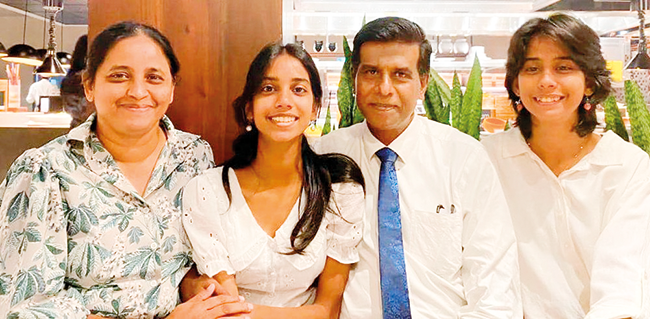
Malinda with his three bosses – Wife: Samadanie Kiriwandeniya and two Daughters: Mithsandi and Dayadi
Q: What was the most rewarding experience you had as a journalist, political commentator, poet, and a translator?
A: I met Saji Coomaraswamy, then 80 years old, in the strange intersections of orbits set in motion by the hand of God, as she might say, or by reasons that really do not require investigation because what matters is intersection alone, as I would say. She responded to something I wrote. We corresponded, met, and became firm friends. She was one of my most insightful critics. She was absolutely civilised when pointing out errors or critiquing positions I chose. She was kind and gentle even when her objections were harsh. I loved her much and miss her so much, still.
Q: How do you describe the four years you spent as the Editor-in-Chief of ‘The Nation’?
A: In a word, exhilarating. I enjoyed working with a team of very young journalists to produce the best weekend paper we possibly could. ‘The Nation’ had acquired the unenviable reputation of being a ‘kept rag’ of the then government. The archives would demonstrate the commitment of my team to provide balanced political coverage and commentary, over and above publishing innumerable touch-me-not stories, excellent news features and insightful commentary on business, sports, arts, and literature in an elegantly designed weekend newspaper. It was particularly pleasing since I was part of the original editorial staff and had given the newspaper its name.
Q: What was the biggest advertising campaign you were involved in, as a copywriter?
A: I do not know about size or impact, but the campaign I was most proud to be involved in was on domestic violence, child abuse and sexual harassment at the workplace, commissioned by UNHRC. I wrote the copy for the print ads, based on which radio and television commercials were designed. Phoenix O&M won multiple SLIM awards as well as several Abby Awards for this campaign which was supervised from beginning to end by the Executive Creative Director Ruchi Sharma, who was principally responsible for getting my creative juices working with a simple suggestion, ‘think about marital vows.’
Q: What was your key contribution during your last permanent job as the Director/CEO of Hector Kobbekaduwa Agrarian Research and Training Institute?
A: I observed that brilliant research on agriculture, particularly the social and economic aspect of this vast and complex sphere, has been conducted and is being conducted, generating a vast archive of knowledge as well as policy recommendations. Unfortunately, there are no formal conduits for the knowledge thus produced to inform policy making forums. To correct this, I signed memoranda of understanding with all universities which had agriculture faculties, thereby setting in place a framework and mechanism for collaborative research and training. It was a necessary first step in mobilising the scientific community to help shape agriculture policy in Sri Lanka.
Q: Can you explain your key achievements in chess?
A: The records will show that I was in the team that represented Sri Lanka at the Asian Team Championship in 1986, that I was the manager of several youth contingents taking part in world and Asian age group events including the Junior Olympiad, and that I was the non-playing captain/manager of the team that won a category gold medal at the 2014 Olympiad held in Tromso, Norway. Nothing however comes close to the nurturing of young chess players, primarily students at Royal College but also players of all ages, schools and regions I’ve mentored over a period of 40 years.
Q: I have seen you very happy using the Commons Café as your informal office in Colombo. What does your schedule look like on a normal workday?
A: There are no ‘normal’ workdays. There’s nothing ‘normal’ about my life, my days. The plus side of being unemployed or under-employed (‘freelance’ gives it a bit of dignity of course) is that one can never really be a prisoner of routine. So ‘the day’ is determined by the indeterminate. In other words, the lives, and priorities of people who knowingly or unknowingly ‘lance’ me on account of the ‘free’ (yes, I’ve written an article on this subject!). I do get around to must-do writing somehow, though. As for ‘happiness,’ why have a long face, why spread the bad news around?
Next week, 3Ps will feature the best-selling female visual artist of Sri Lanka…
Features
Pharmaceuticals, deaths, and work ethics

Yet again, deaths caused by questionable quality pharmaceuticals are in the news. As someone who had worked in this industry for decades, it is painful to see the way Sri Lankans must face this tragedy repeatedly when standard methods for avoiding them are readily available. An article appeared in this paper (Island 2025/12/31) explaining in detail the technicalities involved in safeguarding the nation’s pharmaceutical supply. However, having dealt with both Western and non-Western players of pharmaceutical supply chains, I see a challenge that is beyond the technicalities: the human aspect.
There are global and regional bodies that approve pharmaceutical drugs for human use. The Food and Drug Administration (USA), European Medicines Agency (Europe), Medicine and Health Products Regulatory Agency (United Kingdom), and the Pharmaceuticals and Medical Devices Agency (Japan) are the major ones. In addition, most countries have their own regulatory bodies, and the functions of all such bodies are harmonized by the International Council for Harmonization (ICH) and World Health Organization (WHO). We Sri Lankan can take solace in knowing that FDA, the premier drug approval body, came into being in 1906 because of tragedies similar to our own. Following the Elixir Sulfanilamide tragedy that resulted in over one hundred deaths in 1938 and the well-known Phthalidomide disaster in 1962, the role and authority of FDA has increased to ensure the safety and efficacy of the US drug supply.
Getting approval for a new proprietary pharmaceutical is an expensive and time-consuming affair: it can take many billions of dollars and ten to fifteen years to discover the drug and complete all the necessary testing to prove safety and efficacy (Island 2025/01/6). The proprietary drugs are protected by patents up to twenty years, after which anyone with the technical knowhow and capabilities can manufacture the drug, call generics, and seek approval for marketing in countries of their choice. This is when the troubles begin.
Not having to spend billions on discovery and testing, generics manufactures can provide drugs at considerable cost savings. Not only low-income countries, but even industrial countries use generics for obvious reasons, but they have rigorous quality control measures to ensure efficacy and safety. On the other hand, low-income countries and countries with corrupt regulatory systems that do not have reasonable quality control methods in place become victims of generic drug manufacturers marketing substandard drugs. According to a report, 13% of the drugs sold in low-income countries are substandard and they incur $200 billion in economic losses every year (jamanetworkopen.2018). Sri Lankans have more reasons to be worried as we have a history of colluding with scrupulous drug manufactures and looting public funds with impunity; recall the immunoglobulin saga two years ago.
The manufacturing process, storage and handling, and the required testing are established at the time of approval; and they cannot be changed without the regulatory agency’s approval. Now a days, most of the methods are automated. The instruments are maintained, operated, and reagents are handled according to standard operating procedures. The analysts are trained and all operations are conducted in well maintained laboratories under current Good Manufacturing Procedures (cGMP). If something goes wrong, there is a standard procedure to manage it. There is no need for guess work; everything is done following standard protocols. There is traceability; if something went wrong, it is possible to identify where, when, and why it happened.
Setting up a modern analytical laboratory is expensive, but it may not cost as much as a new harbor, airport, or even a few kilometers of new highway. It is safe to assume that some private sector organizations may already have a couple of them running. Affordability may not be a problem. But it is sad to say that in our part of the world, there is a culture of bungling up the best designed system. This is a major concern that Western pharmaceutical companies and regulatory agencies have in incorporating supply chains or services from our part of the world.
There are two factors that foster this lack of work ethics: corruption and lack of accountability. Admirably, the private sector has overcome this hurdle for the most part, but in the public sector, from top to bottom, lack of accountability and corruption have become a pestering cancer debilitating the economy and progress. Enough has been said about corruption, and fortunately, the present government is making an effort to curb it. We must give them some time as only the government has changed, not the people.
On the other hand, lack of accountability is a totally alien concept for our society. In many countries, politicians are held accountable at elections. We give them short breaks, to be re-elected at the next election, often with super majorities, no matter how disastrous their actions were. When it comes to government servants, we have absolutely no way to hold them accountable. There is absolutely no mechanism in place; it appears that we never thought about it.
Lack of accountability refers to the failure to hold individuals responsible for their actions. This absence of accountability fosters a culture of impunity, where corrupt practices can thrive without fear of repercussions. In Sri Lanka, a government job means a lifetime employment. There is no performance evaluation system; promotions and pay increases are built in and automatically implemented irrespective of the employee’s performance or productivity. The worst one can expect for lapses in performance is a transfer, where one can continue as usual. There is no remediation. To make things worse, often the hiring is done for political reasons rather than on merit. Such employees have free rein and have no regard for job responsibilities. Their managers or supervisors cannot take actions as they have their political masters to protect them.
The consequences of lack of accountability in any area at any level are profound. There is no need to go into detail; it is not hard to see that all our ills are the results of the culture of lack of accountability, and the resulting poor work ethics. Not only in the pharmaceuticals arena, but this also impacts all aspects of products and services available. If anyone has any doubts, they should listen to COPE committee meetings. Without a mechanism to hold politicians, government employees, and bureaucrats accountable for their actions or lack of it, Sri Lanka will continue to be a developing country forever, as has happened over the last seventy years. As a society, we must take collective actions to demand transparency, hold all those in public service accountable, and ensure that nation’s resources are used for the benefit of all citizens. The role of ethical and responsible journalism in this respect should not be underestimated.
by Geewananda Gunawardana, Ph.D. ✍️
Features
Tips for great sleep

Although children can sleep well, most adults have trouble getting a good night’s sleep. They go to bed each night, but find it difficult to sleep. While in bed they toss and turn until daybreak. Such people cannot be expected to do any work properly. Upon waking they get ready to go for work, but they feel exhausted. While travelling to workplaces they doze off on buses and trains. In fact sleep deprivation leads to depression. Then they seek medical help to get over the problem.
Some people take sleeping pills without consulting a doctor. Sleeping pills might work for a few days, but you will find it difficult to drag yourself out of bed. What is more, you will feel drowsy right throughout the day. If you take sleeping pills regularly, you will get addicted to them.
A recent survey has revealed that millions of Asians suffer from insomnia – defined as an inability to fall asleep or to sleep through the night. When you do not get enough sleep for a long time, you might need medical treatment. According to a survey by National University Hospital in Singapore, 15 percent of people in the country suffer from insomnia. This is bad news coming from a highly developed country in Asia. It is estimated that one third of Asians have trouble sleeping. As such it has become a serious problem even for Sri Lankans.
Insomnia
Those who fail to take proper treatment for insomnia run the risk of sleep deprivation. A Japanese study reveals that those who sleep five hours or less are likely to suffer a heart attack. A healthy adult needs at least seven hours of sleep every day. When you do not get the required number of hours for sleep, your arteries may be inflamed. Sleep deprived people run the risk of contracting diabetes and weight gain. An American survey reveals that children who do not get deep sleep may be unnaturally small. This is because insomnia suppresses growth hormones.
It is not the length of sleep that matters. The phases of sleep are more important than the number of hours you sleep. Scientists have found that we go through several cycles of 90 minutes per night. Every cycle consists of three phases: light sleep, slumber sleep and dream sleep. When you are in deep sleep your body recuperates. When you dream your mind relaxes. Light sleep is a kind of transition between the two.
Although adults should get a minimum seven hours of sleep, the numbers may vary from person to person. In other words, some people need more than seven hours of sleep while others may need less. After the first phase of light sleep you enter the deep sleep phase which may last a few minutes. The time you spend in deep sleep may decrease according to the proportion of light sleep and dream sleep.
Napoleon Bonaparte
It is strange but true that some people manage with little sleep. They skip the light sleep and recuperate in deep sleep and dream sleep. For instance, Napoleon Bonaparte used to sleep only for four hours a night. On the other hand, we sleep at different times of the day. Some people – known as ‘Larks’ – go to bed as early as 8 p.m. There are ‘night owls’ who go to bed after midnight. Those who go to bed late and get up early are a common sight. Some of them nod off in the afternoon. This shows that we have different sleep rhythms. Dr Edgardo Juan L. Tolentino of the Philippine Department of Health says, “Sleep is as individual as our thumb prints and patterns can vary over time. Go to bed only when you are tired and not because it’s time to go to bed.”
If you are suffering from sleep deprivation, do not take any medication without consulting a doctor. Although sleeping pills can offer temporary relief, you might end up as an addict. Therefore take sleeping pills only on a doctor’s prescription. He will decide the dosage and the duration of the treatment. What is more, do not increase the dose yourself and also do not take them with alcohol.
You need to exercise your body in order to keep it in good form. However, avoid strenuous exercises late in the evening because they would stimulate the body and increase the blood circulation. This does not apply to sexual activity which will pave the way for sound sleep. If you are unable to enjoy sleep, have a good look at your bedroom. The bedroom and the bed should be comfortable. You will also fall asleep easily in a quiet bedroom. Avoid bright lights in the bedroom. Use curtains or blinds to darken the bedroom. Use a quality mattress with proper back support.
Methods
Before consulting a doctor, you may try out some of the methods given below:
* Always try to eat nutritious food. Some doctors advise patients to take a glass of red wine before going to bed. However, too much alcohol will ruin your sleep. Avoid smoking before going to bed because nicotine impairs the quality of sleep.
* Give up the habit of drinking a cup of coffee before bedtime because caffeine will keep you awake. You should also avoid eating a heavy meal before going to bed. A big meal will activate the digestive system and it will not allow the body to wind down.
* Always go to bed with a relaxed mind. This is because stress hormones in the body can hinder sleep. Those who lead stressful lives often have trouble sleeping. Such people should create an oasis between the waking day’s events and going to bed. The best remedy is to go to bed with a novel. Half way through the story you will fall asleep.
* Make it a point to go to bed at a particular time every day. When you do so, your body will get attuned to it. Similarly, try to get up at the same time every day, including holidays. If you do so, such practices will ensure your biological rhythm.
* Avoid taking a long nap in the afternoon. However, a power nap lasting 20 to 30 minutes will revitalise your body for the rest of the day.
* If everything fails, seek medical help to get over your problem.
(karunaratners@gmail.com)
By R.S. Karunatne
Features
Environmental awareness and environmental literacy
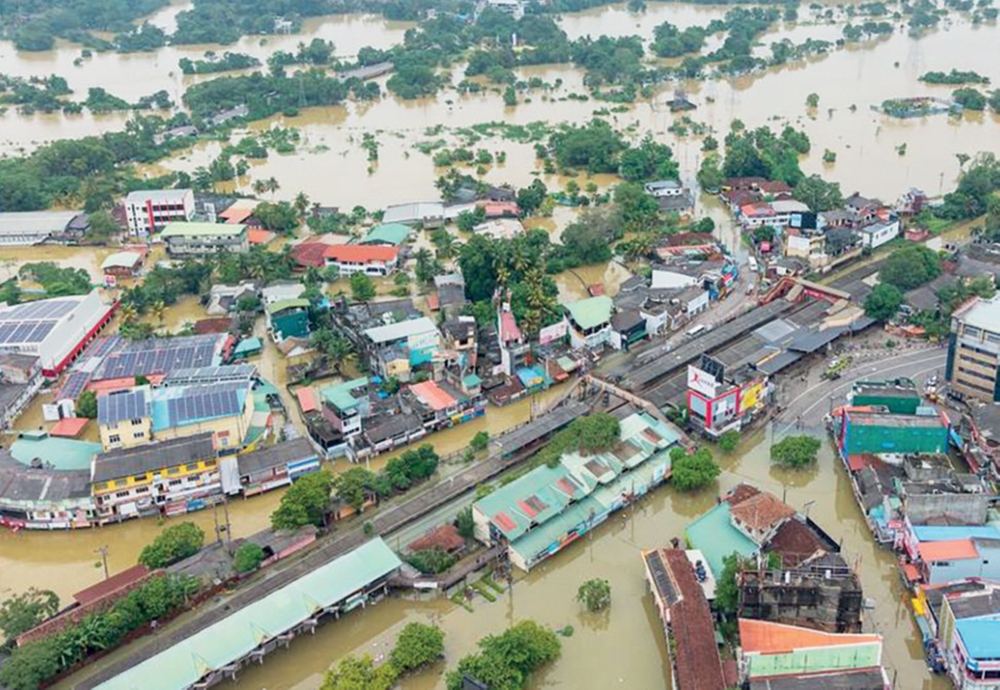
Two absolutes in harmonising with nature as awareness sparks interest – Literacy drives change
Hazards teach lessons to humanity.
Before commencing any movement to eliminate or mitigate the impact of any hazard there are two absolutes, we need to pay attention to. The first requirement is for the society to gain awareness of the factors that cause the particular hazard, the frequency of its occurrence, and the consequences that would follow if timely action is not taken. Out of the three major categories of hazards that have been identified as affecting the country, namely, (i) climatic hazards (floods, landslides, droughts), (ii) geophysical hazards (earthquakes, tsunamis), and (iii) endemic hazards (dengue, malaria), the most critical category that frequently affect almost all sectors is climatic hazards. The first two categories are natural hazards that occur independently of human intervention. In most instances their occurrence and behaviour are indeterminable. Endemic hazards are a combination of both climatic hazards and human negligence.
ENVIRONMENTAL AWARENESS
‘In Ceylon it never rains but pours’ – Cyclone Ditwah and Our Experiences
Climatic hazards, as experienced in Sri Lanka are dependent on nature, timing and volume of rainfall received during a year. The patterns of rainfall received indicate that, in most instances, rainfalls follow a rhythmic pattern, and therefore, their advent and ferocity as well as duration could in most instances be forecast with near accuracy. Based on analyses of long-term mean monthly rainfall data, Dr. George Thambyahpillay (Citation, University of Ceylon Review vol. XVI No. 3 & 4 Jul.-Oct 1958, pp 93-106 1958) produced a research paper wherein he exposed a certain Rainfall Rhythm in Ceylon. He opens his paper with the statement ‘In Ceylon it never rains but it pours’, which clearly shows both the velocity and the quantum of rain that falls in the island. ‘It is an idiom which expresses that ‘when one bad thing happens, a lot of other bad things also happen, making the situation even worse’. How true it is, when we reminisce short and long term impacts of the recent Ditwah cyclone.
Proving the truism of the above phrase we have experienced that many climatic hazards have been associated with the two major seasonal rainy phases, namely, the Southwest and Northeast monsoons, that befall in the two rainy seasons, May to September and December to February respectively. This pattern coincides with the classification of rainy seasons as per the Sri Lanka Met Department; 1) First inter-monsoon season – March-April, 2) Southwest monsoon – May- September, 3) Second Inter-monsoon season – October-November, and 4) Northeast monsoon – December-February.
The table appearing below will clearly show the frequency with which climatic hazards have affected the country. (See Table 1: Notable cyclones that have impacted Sri Lanka from 1964-2025 (60 years)
A marked change in the rainfall rhythm experienced in the last 30 years
An analysis of the table of cyclones since 1978 exposes the following important trends:
(i) The frequency of occurrence of cyclones has increased since 1998,
(ii) Many cyclones have affected the northern and eastern parts of the country.
(iii) Ditwah cyclone diverged from this pattern as its trajectory traversed inland, affecting the entire island. (similar to cyclones Roanu and Nada of 2016).
(iv) A larger number of cyclones occur during the second inter-monsoon season during which Inter-Monsoonal Revolving Storms frequently occur, mainly in the northeastern seas, bordering the Bay of Bengal. Data suggests the Bay of Bengal has a higher number of deadlier cyclones than the Arabian Sea.
(v) Even Ditwah had been a severe cyclonic outcome that had its origin in the Bay of Bengal.
(vi) There were several cyclones in the years 2016 (Roanu and Nada), 2020 (Nivar and Burevi), 2022 (Asani and Mandous) and 2025 (Montha and Ditwah). In 2025, exactly a month before Ditwah, (November 27, 2025) cyclone Montha affected the country’s eastern and northern parts (October 27) – a double whammy.
(vii) Climatologists interpret that Sri Lanka being an island in the Indian Ocean, the country is vulnerable to cyclones due to its position near the confluence of the Arabian Sea, the Bay of Bengal and the Indian Ocean.
(viii) The island registers increased cyclonic activity, especially in the period between October and December.
The need to re-determine the paddy cultivation seasons Yala and Maha vis-a-vis changing rainfall patterns
Sri Lanka had been faithfully following the rainfall patterns year in year out, in determining the Maha and Yala paddy cultivation seasons. The Maha season falls during the North-east monsoon from September to March in the following year. The Yala season is effective during the period from May to August. However, the current changes in the country’s rainfall pattern, would demand seriously reconsidering these seasons numerous cyclones had landed in the past few years, causing much damage to paddy as well as other cultivations. Cyclones Montha and Ditwah followed one after the other.
The need to be aware of the land we live in Our minds constantly give us a punch-list of things to fixate on. But we wouldn’t have ever thought about whether the environments we live in or do our businesses are hazardous, and therefore, that item should be etched in our punch-list. Ditwah has brought us immense sorrow and hardships. This unexpected onslaught has, therefore, driven home the truth that we need to be ever vigilant on the nature of the physical location we live in and carry on our activities. Japanese need not be told as to how they should act or react in an earthquake or a tsunami. Apart from cellphone-indications almost simultaneously their minds would revolve around magnitude of the earthquake and seismic intensity, tsunami, fires, electricity and power, public transportation, and what to do if you are inside a building or if you are outdoors.
Against this backdrop it is really shocking to know of the experiences of both regional administrators and officials of the NBRO (National Building Research Organisation) in their attempts to persuade people to shift to safer locations, when deluges of cyclone Ditwah were expected to cause floods and earth slips/ landslides
Our most common and frequently occurring natural hazards
Apart from the Tsunami (December 26, 2004), that caused havoc in the Northeastern and Southern coastal belts in the country, our two most natural hazards that take a heavy toll on people’s lives and wellbeing, and cause immense damage to buildings, plantations, and critical infrastructure have been periodic floods and landslides. It has been reported that Ditwah has caused ‘an estimated $ 4.1 billion in direct physical damage to buildings, agriculture and critical infrastructure, which include roads, bridges, railway lines and communication links. It is further reported that total damage is equivalent to 4% of the country’s GDP.’
Floods and rain-induced landslides demand high alert and awareness
As the island is not placed within the ‘Ring of Fire’ where high seismic activity including earthquakes and volcanic activity is frequent, Sri Lanka’s notable hazards that occur almost perennially are floods and landslides; these calamities being consequent upon heavy rains falling during both the monsoonal periods, as well as the intermonsoonal periods where tropical revolving storms occur. When taking note of the new-normal rhythm of the country’s rainfall, those living in the already identified flood-basins would need to be ever vigilant, and conscious of emergency evacuation arrangements. Considering the numbers affected and distress caused by floods and disruptions to commercial activities, in the Western province, some have opined that priority would have been given to flood-prevention schemes in the Kelani river basin, over the Mahaweli multi-development programme.
Geomorphic processes carry on regardless, in reshaping the country’s geomorphological landscape
Geomorphic processes are natural mechanisms that eternally shape the earth’s surface. Although endogenic processes originating in the earth’s interior are beyond human control, exogenic processes occur continuously on or near the earth’s surface. These processes are driven by external forces, which mainly include:
(i) Weathering: rock-disintegration through physical, chemical and biological processes, resulting in soil and sediment formation.
(ii) Erosion: Dislocation/ removal and movement of weathered materials by water and wind (as ice doesn’t play a significant role in the Tropics).
(iii) Transportation: The shifting of weathered material to different locations often by rivers, wind, heavy rains,
(iv) Deposition: Transported material being settled forming new landforms, lowering of hills, and flattening of undulated land or depositing in the seabed.
What we witnessed during heavy rains caused by cyclone Ditwah is the above process, what geomorphologists refer to as ‘denudation’. This process is liable to accelerate during spells of heavy rain, causing landslides, landfalls, earth and rock slips/ rockslides and landslides along fault lines.
Hence, denudation is quite a natural phenomenon, the only deviation being that it gets quickened during heavy rains when gravitational and other stresses within a slope exceed the shear strength of the material that forms slopes.
It is, therefore, a must that both people and relevant authorities should be conscious of the consequences, as Ditwah was not the first cyclone that hit the country. Cyclone Roanu in May 2016 caused havoc by way of landslides, Aranayake being an area severely affected.
Conscious data-studies and analyses and preparedness; Two initials to minimise potential dangers
Sri Lanka has been repeatedly experiencing heavy rain–related disasters as the table of cyclones clearly shows (numbering 22 cyclones within the last 60 years). Further, Sri Lanka possesses comprehensive hazard profiles developed to identify and mitigate risks associated with these natural hazards.
A report of the Department of Civil Engineering, University of Moratuwa, says “Rain induced landslides occur in 13 major districts in the central highland and south western parts of the country which occupies about 20-30% of the total land area, and affects 30-38% of total population (6-7.6 Million). The increase of the number of landslides and the affected areas over the years could be attributed to adverse changes in the land use pattern, non-engineered constructions, neglect of maintenance and changes in the climate pattern causing high intensity rainfalls.”
ENVIRONMENTAL LITERACY
Environmental awareness being simply knowing facts will be of no use unless such knowledge is coupled with environmental literacy. Promoting environmental literacy is crucial for meeting environmental challenges and fostering sustainable development. In this context literacy involves understanding ecological principles and environmental issues, as well as the skills and techniques needed to make informed decisions for a sustainable future. This aspect is the most essential component in any result-oriented system to mitigate periodic climate-related hazards.
Environmental literacy rests upon several crucial pillars
The more important pillars among others being:
· Data-based comprehensive knowledge of problems and potential solutions
· Skills to analyse relevant data and information critically, and communicate effectively the revelations to relevant agencies promptly and accurately.
· Identification and Proper interconnectedness among relevant agencies
· Disposition – The attitudes, values and motivation that drive responsible environmental behaviour and engagement.
· Action – The required legal framework and the capacity to effectively translate knowledge, skills and disposition into solid action that benefits the environment.
· Constant sharing of knowledge with relevant international bodies on the latest methods adopted to harmonise human and physical environments.
· Education programmes – integrating environmental education into formal curricula and equipping students with a comprehensive understanding of ecosystems and resource management. Re-structuring the geography syllabus, giving adequate emphasis to environmental issues and changing patterns of weather and overall climate, would seem a priority act.
· Experiential learning – Organising and engaging in field studies and community projects to gain practical insights into environmental conservation.
· Establishing area-wise warning systems, similar to Tsunami warning systems.
· Interdisciplinary Approaches to encourage students to relate ecological knowledge with such disciplines as geology, geography, economics and sociology.
· Establishing Global Collaboration – Leveraging technology and digital platforms to expand access to environmental education and enhance awareness on global environmental issues.
· Educating the farming community especially on the changes occurring in weather and climate.
· Circumventing high and short duration rainfall extremes by modifying cultivation patterns, and introducing high yielding short-duration yielding varieties, including paddy.
· Soil management that reduces soil erosion
· Eradicating misconceptions that environmental literacy is only for scientists (geologists), environmental professionals and relevant state agencies.
A few noteworthy facts about the ongoing climatic changes
1. The year 2025 was marked by one of the hottest years on record, with global
temperatures surpassing 1.5ºC.
2. Russia has been warming at more than twice the global average since 1976, with 2024 marking the hottest year ever recorded.
3. Snowfalls in the Sahara – a rare phenomenon, with notable occurrences recorded in recent years.
4. Monsoon rains in the Indian Subcontinent causing significant flooding and landslides
5. Warming of the Bay of Bengal, intensifying weather activity.
6. The Himalayan region, which includes India, Nepal, Pakistan, and parts of China, experiencing temperatures climbing up to 2ºC above normal, along with widespread above-average rainfall.
7. Sri Lanka experienced rainfall exceeding 300 m.m. in a single day, an unprecedented occurrence in the island’s history. Gammaduwa, in Matale, received 540 m.m. of rainfall on a day, when Ditwah rainfall was at its peak.
The writer could be contacted at kalyanaratnekai@gmail.com
by K. A. I. KALYANARATNE ✍️
Former Management Consultant /
Senior Manager, Publications
Postgraduate Institute of Management,
University of Sri Jayewardenepura,
Vice President, Hela Hawula
-

 News19 hours ago
News19 hours agoPrivate airline crew member nabbed with contraband gold
-

 News3 days ago
News3 days agoHealth Minister sends letter of demand for one billion rupees in damages
-

 Features7 days ago
Features7 days agoIt’s all over for Maxi Rozairo
-

 News6 days ago
News6 days agoLeading the Nation’s Connectivity Recovery Amid Unprecedented Challenges
-

 Opinion5 days ago
Opinion5 days agoRemembering Douglas Devananda on New Year’s Day 2026
-

 News7 days ago
News7 days agoDr. Bellana: “I was removed as NHSL Deputy Director for exposing Rs. 900 mn fraud”
-

 News6 days ago
News6 days agoDons on warpath over alleged undue interference in university governance
-
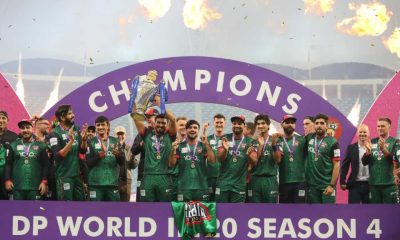
 Latest News18 hours ago
Latest News18 hours agoCurran, bowlers lead Desert Vipers to maiden ILT20 title

